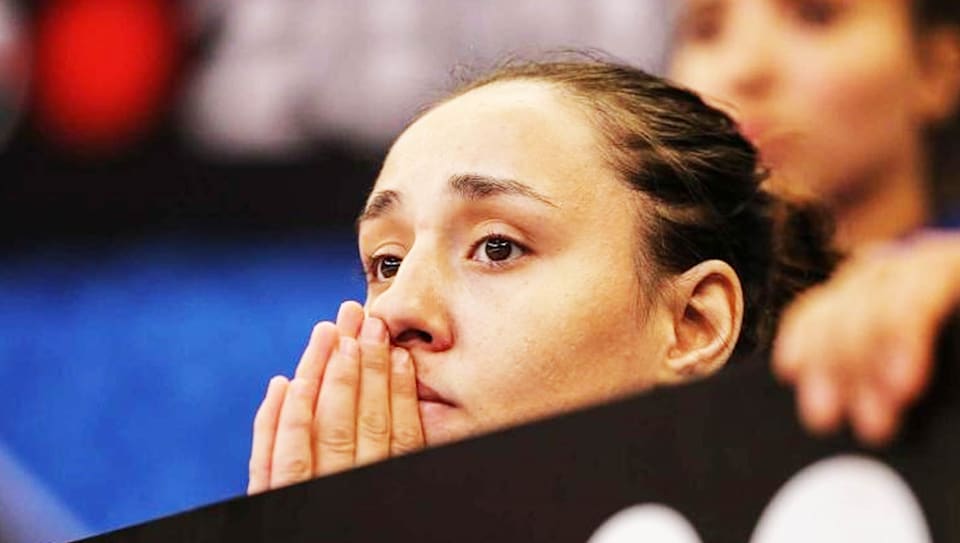Judo central to mental health for Refugee Olympic Team hopeful
Syria’s Sanda Aldass “cannot have imagined” getting through the trauma of fleeing civil war, being separated from her husband and infant child and forging a new life in a foreign country without the solace of sport. A lifelong judoka, she is now fervently hoping to be part of the Refugee Olympic Team at Tokyo 2020.
Judo has given Syrian Sanda Aldass a living and a dream but, perhaps most importantly of all, it has kept her steady during a challenging past five years.
“If I had sat doing nothing, I would have gone crazy,” Aldass said.
The 29-year-old, who was for many years an integral member of the Syrian national women’s judo squad, is referring to the almost nine months she spent in a refugee camp in the Netherlands in 2015. She had managed to escape the civil war devastating her country, but at huge personal cost. Her two-and-a-half-year-old son and husband had to stay in Syria while she looked to secure refugee status.
“Running around and doing some exercises filled up my time and also kept me in good mental health,” Aldass said, before revealing that she even managed to do some judo. “I knew eventually they would come and that we would have a good place to live in. That let me cool down a little bit.”
Her husband, Fadi Darwish, also a national judoka and coach, had initially remained in Syria because his salary was still able to provide for the couple’s young son during the ravages of war. After nearly six tough months apart, during which video calls just about placated mother and son, the family were finally reunited. Three months later they were shown to their new home outside Amsterdam.
Next came the challenge of building a new life and integrating into a foreign culture. Judo, again, came to the rescue.
“You are there for the first time and everything is difficult – the environment, the people, the culture. Everything around you is different. You have other responsibilities. You have to study, find work. Not everything comes easy like when you were back in your country,” Aldass said.
But to be able to be part of the judo family and stand on the mat again and do what you love was a great thing to do
The couple found dojos all around them, although there were still hurdles to overcome. Darwish was not initially able to resume coaching, requiring a Dutch certificate to be able to work. This meant language school and even a return to the competitive mat for the previously retired judoka. For Aldass there was a pause for more prosaic reasons: she fell pregnant and gave birth to the couple’s second child.
But eventually, their chosen sport delivered. Darwish sought out many of the couple’s teammates from Syria who had made their way to Europe, Aldass returned to the mat and together they caught the eye of the International Judo Federation (IJF). In 2019, they were invited to join the support programme for refugee athletes, and later in the year Aldass competed with fellow refugees in the World Championship mixed team competition.
Now, the duo’s days are once again dominated by judo – and the small matter of three young children.
“Before the coronavirus [outbreak], my regular day was waking up, sending my older son to school. Then going with my husband to Amsterdam [around 30 minutes’ drive] to train for the morning. Then come back, he goes shopping, I look after the [younger] kids, do the things around the house then make some food and again go and train in the afternoon [in Almira, 10 minutes’ drive from home],” Aldass explained.

“Back home in the evening to feed the kids and play with them, check their homework, read a story to them and put them to bed. Then I also go to bed because the day has been so long.”
Some equipment housed in the back yard and permission to go outside to run has helped Aldass keep going through lockdown, as has the fact her husband is her coach. “It’s good, he can push me a little bit,” she laughed.
The duo have a lot to aim for. Aldass is one of 50 refugee athletes currently being considered for the Olympic Games Tokyo 2020 team. It is a prospect almost too alluring for the mother-of-three to contemplate.
“Wow. It’s more than a dream coming true. It’s just a dream now, out there it would be a dream coming true. I won’t believe it until it’s like, ‘Wow, I really made it’,” Aldass said. “My kids are like, ‘Mum, you have to go to the Olympics’. The goal for the whole family is reaching the Olympics. We will see. I am not thinking too far ahead.”
But, just as importantly, the family look around them and feel good.
“Of course, it feels like home,” Aldass said of the Netherlands. “We are just missing our families, that’s the only missing thing. We fit in, my husband is working with the IJF and also me, we are doing it not only as a sport, but also as a job. My kids are going to school. We have a lovely home and a nice family. I can’t imagine doing it without sport.”